Home »
Toyota has revealed the starting price for its Dakar Rally-inspired Toyota Hilux GR Sport II with order books now open.
The top of the range Hilux will cost £49,750 inc VAT, putting it in a similar price bracket to a recently launched Ford Ranger Wildtrak X. The price for the GR Sport II is £41,523, excluding VAT.
As part of the package there's entirely new suspension with a wider track to improve handling. Styling changes include new 17-inch black alloys and an aero sports bar.
Power remains unchanged with the current line-up's 2.8-litre engine producing 201bhp and 500Nm of torque. This is the same engine used in the Toyota Hilux Invincible X which is the top-of-the-range pick-up model in the standard range.
The £50k on the road price is also a whopping £10,000 more than the next model down in the range, the Hilux Invincible X. The price puts in on a par with the £49,000 Wildtrak X - which uses the 2-litre bi turbo engine - and slightly behind the £53,000 Wildtrak the V6 engine.
The inside gets a new Toyota Smart Connect+ multimedia system which includes Apple CarPlay and Android Auto smartphone connectivity as well as a nine-speaker JBL audio system.
Van Reviewer has already been behind the wheel of the new GR Sport II Hilux and was suitably impressed by the new suspension changes. The wider track does improve handling, especially on road where the Hilux now feels far more engaged than the standard model. The increased ride height also gives it a slight performance boost off-road - although the gains are no where near as noticeable as they are on-road.
Toyota also claims the new setup delivers less noise and vibration, which we can confirm.
The improved suspension also enables the new GR Sport II to claim some small wins on the off-roading capabilites, in terms of the numbers it can tackle. The approach angle has increased from 29 to 30 degrees, while the ride height boost of 20mm has improved ground clearance slightly. The front and rear tracks have also been increased by 140mm and 150mm, respectively.
Read the full review of the Toyota Hilux GR Sport II below:
Toyota will add a new 48V electrical system to its Hilux range to improve fuel economy and performance. The Toyota Hilux Hybrid 48V is the first time electrification has been integrated into the Hilux lineup since its launch in 1968 in Japan.
Since then, the Toyota Hilux has become a workhorse icon and the Hilux Hybrid 48V is the next phase in maintaining its image as the world transitions to more sustainable vehicles. The announcement of the hybrid Hilux comes just weeks after the reveal of a more aggressive Toyota Hilux GR Sport II version.
The Hybrid 48V will only be available in double cab format pairing the standard 2.8-litre diesel engine with a specially designed 48V hybrid system.
A belt system connects the engine to a compact motor generator, which charges the new 48V lithium-ion battery. This lightweight battery, positioned under the rear seats to minimize cabin space impact, weighs just 7.6kg and also powers the vehicle's 12V system via a DC/DC converter.
Similar to Toyota's full hybrid systems, the battery regenerates braking energy during deceleration, maximising efficiency and providing additional braking power. When charged, the battery returns up to 16hp (12 kW) and 65 Nm of torque through the motor. Improving performance and supporting the engine for enhanced acceleration, power, and efficiency.
A new two-arm belt tensioner and stronger belt material contribute to improved drivability and a quieter ride.
Toyota says that the Hilux Hybrid 48V offers a combination of responsive acceleration, improved braking, and enhanced fuel efficiency, all while delivering a smoother ride on any terrain. The hybrid system should provide better throttle response and smoother acceleration, particularly from a standstill, while regenerative braking creates a more natural and effective deceleration feel.
An improved stop-start system allows the engine to remain off for longer periods, contributing to a fuel efficiency improvement of up to 5% compared to the standard diesel powertrain.
The motor generator's power allows for smoother acceleration on rough terrain, while regenerative braking assists with controlled descents. Additionally, the engine's idling speed reduction from 720 rpm to 600 rpm enhances the driver's ability to precisely control the vehicle.
Toyota has yet to comment on the possibility of a hybrid or full battery electric pick-up truck. Rivals Ford have annouced a Ranger PHEV, while Isuzu intends to build a D-Max BEV by 2025. Meanwhile, Maxus remains the only manufacturer currently offering a fully electric pick-up truck, the Maxus T90EV.
There has been an huge jump in the number of small electric vans being brought to market in 2022 and with technology moving so quickly it’s hard to keep up.
Buyers are understandably wary of committing to new technologies and their capabilities can vary widely.
Van Reviewer is here to make it easier for you, though, with a round-up of the best small electric vans in 2022. Despite out focus being on the best small electric vans of 2022, they do still come in a wide variety of shapes and sizes, there’s also cheap and cheerful to proper premium passenger car-based electric vans and hybrids too.
We rank them in order of what we like best, but to be honest they’re all really good – so check out our little verdict on each.
We'll start off with our second choice on the list....
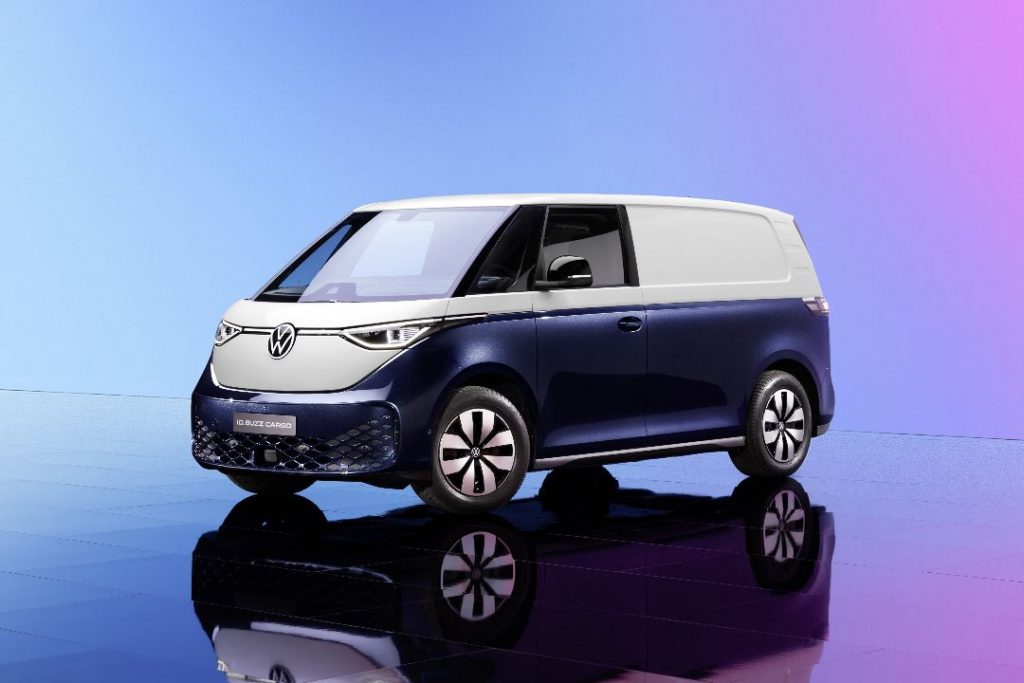
The Volkswagen ID Buzz Cargo is a brand-new electric van that takes its inspiration from the classic Volkswagen Type 2 campervan.
It sits between the Volkswagen Caddy and the Volkswagen Transporter T6.1 in the Volkswagen range in terms of its size and is built on Volkswagen’s shared MEB electric drivetrain platform. Despite being a van, with a load volume of up to 3.9m3 and 650kg, the ID Buzz Cargo actually borrows many of its features from Volkswagen’s passenger car models including the Volkswagen ID.3 and the Volkswagen ID.4 passenger cars.
A 150kW motor powers the van, producing 310Nm of torque in the process. There is currently just one battery option, a 82kWh unit providing a claimed range of up to 256 miles. Charging from 5% to 80% can be done in less than 30 minutes thanks to a maximum charge rate of up to 170kW on a DC charger.
For those needing more payload, a smaller battery pack size is likely to be added to the line-up reducing range but pushing capacity to around 750kg.
Two trim levels are available, Commerce and Commerce Plus, with entry-level models receiving a high level of equipment including LED headlight, a heated driver’s seat, front and rear parking sensors, 10” touchscreen and wireless App-Connect for Apple CarPlay and Android Auto. Commerce Plus models get Adaptive Cruise Control, keyless entry, Park Assist Plus with memory function which allows you to effectively record difficult parking manoeuvres to be automatically repeated. There are also safety features including driver assistance systems like Travel Assist, Lane Assist, Side Assist and Emergency Assist.
Prices start from £38,125 and includes three services and an MoT.
VERDICT: The Volkswagen ID Buzz Cargo’s biggest problem is its price but if you can get over that it is a brilliantly trendy, practical and accomplished van. It’s really a passenger car at heart, but unlike so many where the seats are removed and some blacked out windows added, the ID Buzz Cargo has been co-developed as one so it gets the best of both worlds. Loads of smart tech, super-fast charging, and reasonably good at both volume and payload. It's very nearly the best small electric van of 2022.
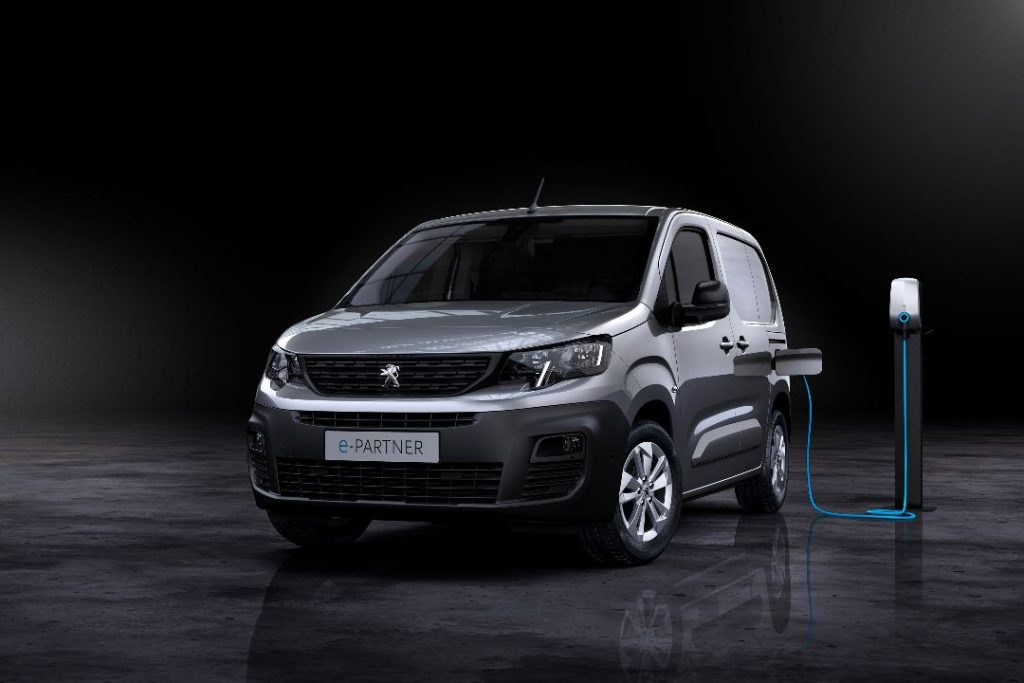
The city vans of Citroen, Peugeot, Toyota and Vauxhall have taken the successful underpinnings of the medium-sized electric van from Stellantis and applied it to the compact packaging of their small van range.
Built in France for Stellantis siblings Citroen, Peugeot and Vauxhall and also produced on behalf of Toyota, the van leads the small van sector with a 171 mile range from a 50kWh battery pack and is paired to a 100kW (136bhp) motor producing 260Nm of torque. Despite being small, the vans offer a load capacity of 4.4m3 thanks to a load-through bulkhead with folding passenger seat which extends the 3.3m3 and 3.9m3 capacities of the standard and long wheelbase vans.
The four vans can also have a very respectable payload of up to 800kg and have a towing capacity of 750kg. For added versatility, they can be specified with a E-Power take off system to power conversions such as fridge units. Charging can be carried out using 100kW charger, taking the battery from zero to 80% in 30 minutes.
The van’s comfortable cabin is focused around the driver with an angled 8in infotainment and navigation touchscreen, and includes several premium features like wireless phone charging and a Surround Rear View system giving a 360-degree view around the van. In total there are 18 driver assistance systems designed to make the van safer for both drivers and other road users.
Prices start from around £27,000 depending on the brand.
VERDICT: These small vans have been on sale for more than a year, coming to market in the autumn of 2021 but they still manage to deliver what the electric audience needs. They’ve not been left behind by the changes in technology either, with powerful motors, decent battery range and the option of both standard and high specification models.
If you want a decent all-rounder these three make a good bet, and the Toyota even comes with a longer warranty.
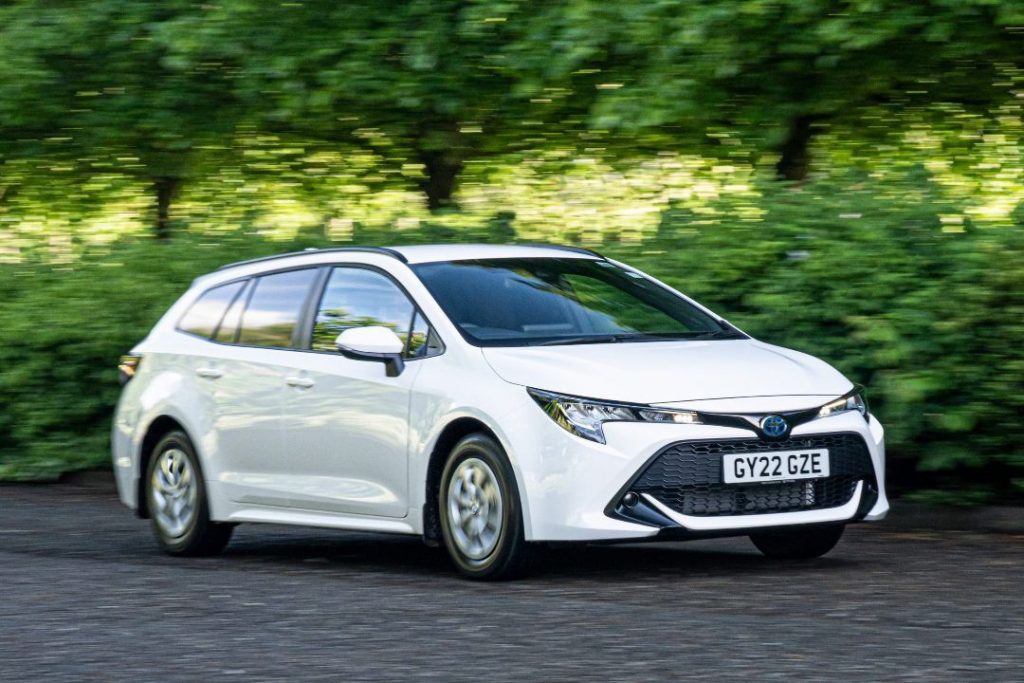
It’s been years since the Astravan disappeared from sale but the Toyota Corolla Commercial Hybrid van more than makes up for the shortfall.
Based on the Corolla Touring Sports estate passenger car, it is a full self-charging hybrid electric van. It looks, feels and drives like a car, but has a healthy 1.3m3 loadspace area in place of the rear seats.
Power comes from a 1.8-litre petrol engine and is paired to a 53kW electric motor, together the petrol hybrid Corolla Commercial produces up to 90kW (120bhp) and 142Nm of torque.
It’s the only engine choice and there’s also only one trim level but the interior is far from your typically commercial vehicle.
The Corolla Commercial gets a decent level of equipment including heated seats, dual-zone climate control and a reversing camera. There’s also LED headlights as standard. When it comes to safety, the Corolla Commercial Hybrid isn’t short on features. It gets adaptive cruise control, high beam assist headlights and lane keep assist as standard. Lane Trace Assist also helps to keep the van in the centre of the lane even while turning slight bends, and there’s Road Sign Assist to remind you of the speed limits with an audible or visual warning.
In the rear, the loadspace floor gets a rubber lining and there is a full-height steel bulkhead to protect the front seat occupants. There’s also an interior light and a 12v power outlet but the important figure is the 425kg payload and 750kg towing capacity.
Prices start from £22,149, excluding VAT.
VERDICT: A self-charging hybrid has managed to sneak into our best small electric vans of 2022 review but with good reason. That’s because the Toyota Corolla Commercial Hybrid is one hell of a package.
It’s a car to van conversion like any other with some questionable sticky window coverings but average fuel consumptions knocking on the door of 60mpg in the real world can’t be sniffed at.
It doesn’t suit everyone, but it brings back a niche segment and adds an electric spin to it. We’re grateful for the effort.
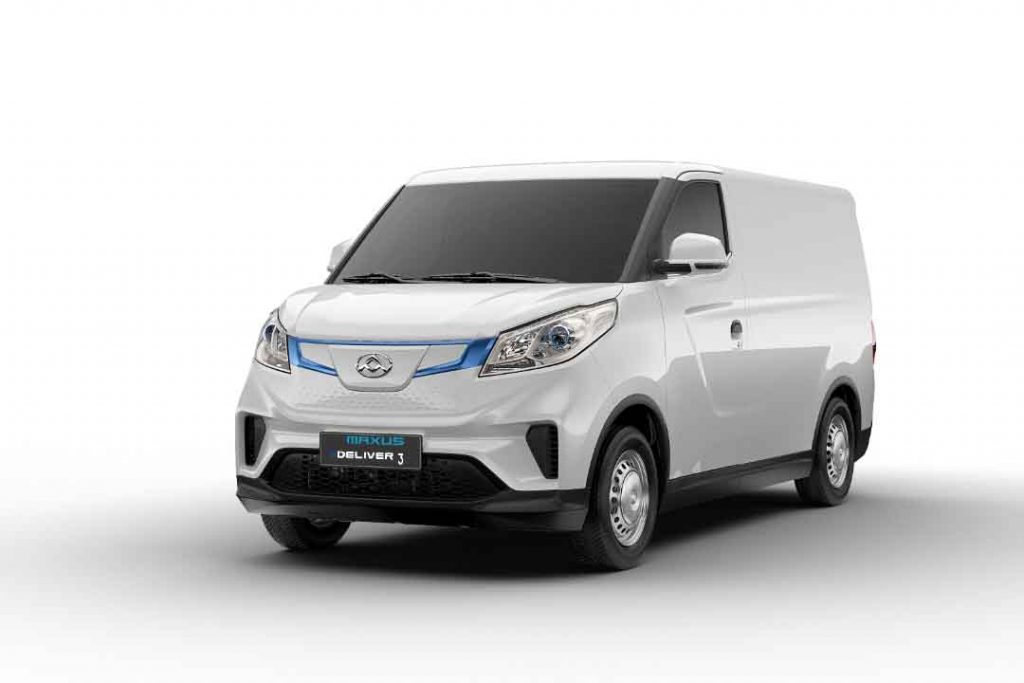
Arguably the first electric van to be launched that was conceived purely as an EV, the Maxus e Deliver 3 was nevertheless a big departure for Chinese-owned Maxus whose line-up had previously consisted of both diesel and electric models.
Designed from the ground-up as a pure electric van with a heavy focus on its aerodynamic performance, the e Deliver 3 has a claimed range of up to 213 miles for its WLTP city range and 151 miles for the combined WLTP standard. It has the option of two battery packs with either 35kWh or 50kWh cells and is paired to a 90KW motor producing 255Nm of torque.
It can carry up to 945kg of payload and despite only being available in a short wheelbase has a volume of 4.8m3. It is the smaller sibling to the large electric van Maxus E Deliver 9 and Maxus E Deliver 7.
Charging times using a DC rapid charger will see the battery level go from 5% to 80% in just 45 minutes, while a three-phase 11kW AC charge will take around five hours.
Standard features include air conditioning, built-in Sat Nav, smartphone mirroring with Apple CarPlay and Android Auto compatibility as well as USB and Bluetooth connectivity.
Operators can also have the e Deliver 3 as a chassis cab and can get real-time telematic data through a partnership with Geotab.
Its most appealing feature, however, is its price with models starting from just £27,000 with a government grant.
VERDICT: We’d love to put the e Deliver 3 much higher in our list of the best small electric vans you can buy in 2022 but it’s not quite the complete package. The battery range is impressive, and there’s adequate power from the motor, but its all the bits and piece in the cabin that let it down. An infotainment system that is frustrating (when it works) and a other little software gremlins too.
Launched in 2020 it fills a natural hole left by the Nissan eNV200 which is definitely a good thing, but it can’t match the finesse of the newer models.
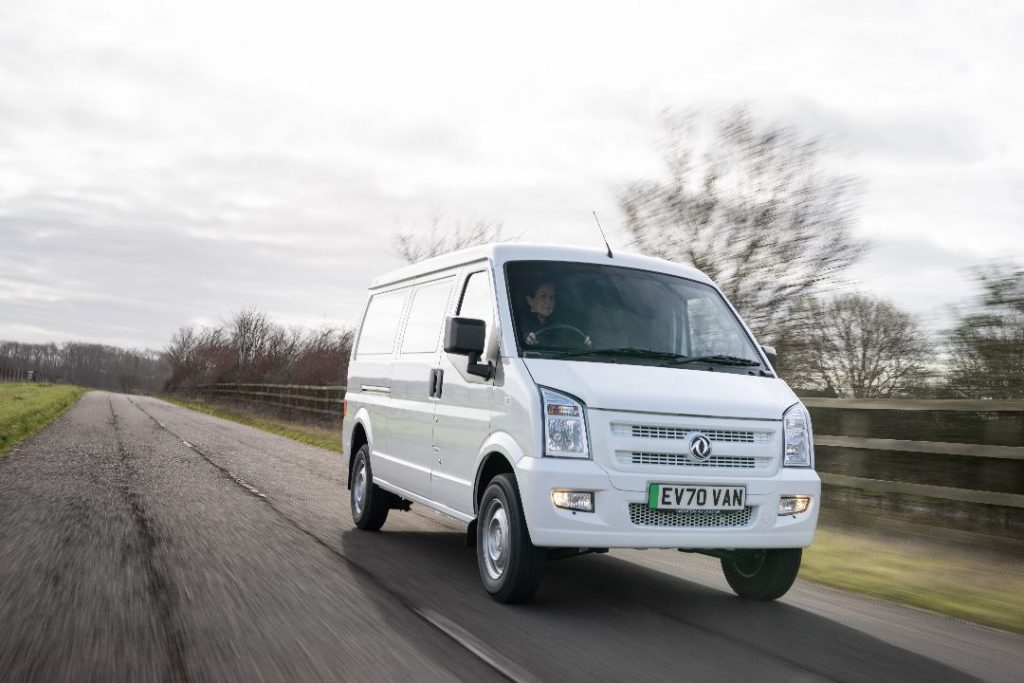
Chinese-made DFSK vans have made a comeback in the UK through importer Innovation Automotive with the quirky midi-van offering a cheap entry-level price to electric van ownership.
The DFSK EC35 looks like a typical Japanese-style microvan with high sides and a narrow width of just 1680mm. It’s unusual proportion don’t mean it is lacking in space with a maximum loadspace volume of 4.8m3 and an equally impressive payload capacity of 1,015kg thanks to its lightweight 1585kg kerbweight. It has a hinged rear tailgate and gets twin sliding doors as standard.
Power comes from a 60kW (80bhp) motor paired to a 39kWh lithium-ion battery with 200Nm of torque. While options are few and far between, one thing you can choose is the maximum speed limit of the van, with a 50mph limited model or a faster 62mph van. Depending on which version you choose will dictate how far you might be able to travel with a claimed range of 101 miles or 166 miles, according to the WLTP testing cycle, for the slow and fast versions respectively. The DFSK EC35 is able to be charged at a maximum rate of 40kW with the battery level going from zero to 80% in around 60 minutes. Topping up the battery to 100% on a 40kW charger will take 90 minutes, while charging from a 7kW wall box will take 6 hours.
Prices start from £20,999 excluding VAT.
VERDICT: Being entirely honest with you, the DFSK is only on the list out of courtesy. It’s not a particularly good van.
But, it will certainly do the job for the right sort of person. If you need to move things around at a walking pace, don’t want to go all that far or need to charge up that often it might just be the van for you.
If you spend more time out of the van than in it, then give it a chance. The price tag is too good not to consider it.
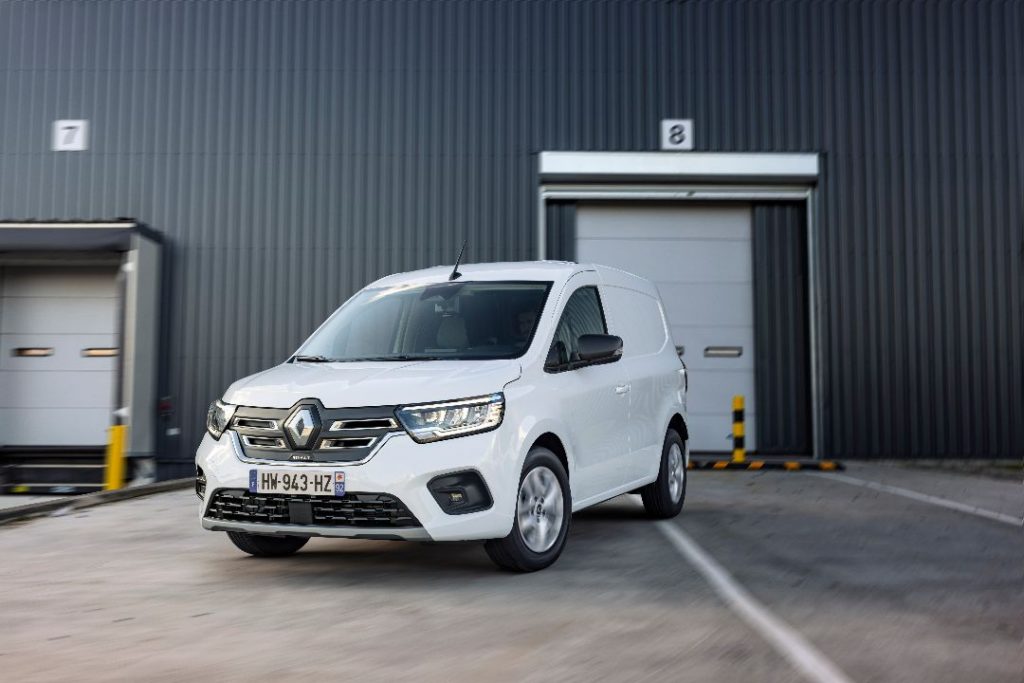
The Renault Kangoo is the oldest and most established name in the small electric van field but the latest version shares only its name with the trailblazer model launched in 2012.
The latest van returns with a new E-Tech name to reflect the rest of the electrified Renault models and is accompanied by two cousins with versions from Mercedes-Benz and Nissan. The three models offer a different take on the electric city van, with Mercedes opting for a more upmarket interior and more standard safety systems than the Renault, while Nissan plays off its warranty support and value.
All three vans, however, use the same 90kW motor paired to a 45kWh battery pack. Range for the vans is 186 miles, while charging can be carried out using an 80kW supply to add more than 100 miles in less than 30 minutes. Slower 22kW charging is also possible as well as a from domestic single-phase 7kW supply though a wallbox which is said to take six hours.
The van is available in two wheelbase lengths with the standard van having a 3.9m3 load volume and the long-wheelbase model up to 4.9m3 of capacity. Payload for regular vans will be up to 600kg but thanks to a higher gross vehicle weight the larger models can transport up to 800kg. They also have a 1,500kg towing capacity.
Prices start at around £30,000 for the Nissan version.
VERDICT: The diesel Renault Kangoo and Mercedes-Benz Citan are both excellent vans, and while the Nissan Townstar Electric is only available as a petrol model, the real strength of these models is the electric version.
Quiet, comfortable and way bigger than the previous generation vans, the Kangoo E-Tech, eCitan and Townstar electric really are the best small electric vans of 2022.
In summary, there's a large amount of choice in the small van market at the moment, and there's bound to be more with a Ford E-Transit Connect likely to be added to Ford's electric van range.
Toyota has taken the wraps off the new Toyota Corolla Commercial Hybrid Electric Van.
The world premiere of the new Corolla Commercial van will make it the first full hybrid van in its class when it goes on sale next year.
It will be built at Toyota’s Burnaston plant, where all Toyota Corollas are made for Europe and will use the same self-charging tech as the Corolla hatchback and Touring Sports passenger models.
Read our Toyota Corolla Commercial Hybrid review
Only one model of the Corolla Commercial is due to be built and will be based on the Corolla Touring Sports 1.8 Hybrid model. The rear seats will be removed and replaced with a proper load area. No other changes are necessary with the same multilink rear suspension and expected fuel economy of between 55.3mpg and 62.7mpg.
That will mean the Toyota Corolla van will have CO2 emissions of between 102g/km and 115g/km. Toyota also says the Toyota Corolla Commercial will have a towing capacity of 750kg with a braked trailer.
Other figures, include payload and volume will be confirmed once the vehicle has been homologated.
The Toyota Corolla Commercial will be able to drive with the diesel engine running or as a pure electric when in EV mode. The new hybrid van will line-up alongside the current range of diesel vans that include the Toyota Proace, Proace City and Land Cruiser Commercial as well as the Proace Electric and Proace City Electric.
Read the Toyota Proace review
“Toyota’s hybrid technology has well-proven reliability and delivers day-to-day savings on running costs with its fuel efficiency. It’s a unique addition to the Toyota Professional range and the wider LCV market and we’re confident will attract strong interest,” said Mark Roden, Toyota (GB) operations director.
Order books will open later on in the year with early indications from Toyota of it having an on the road price of £22,134.
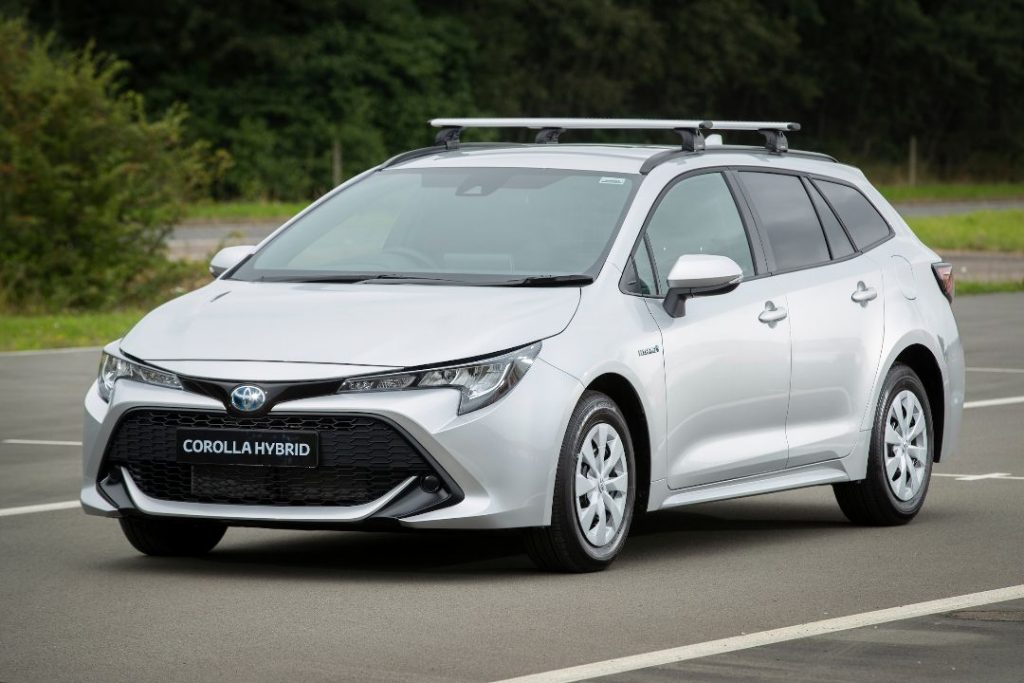
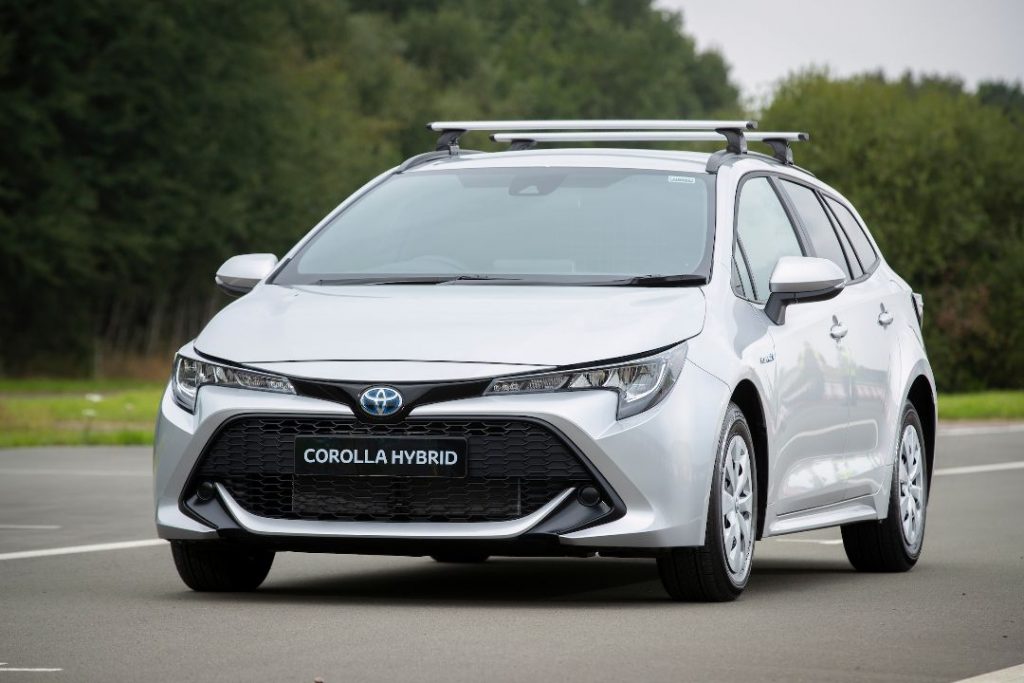
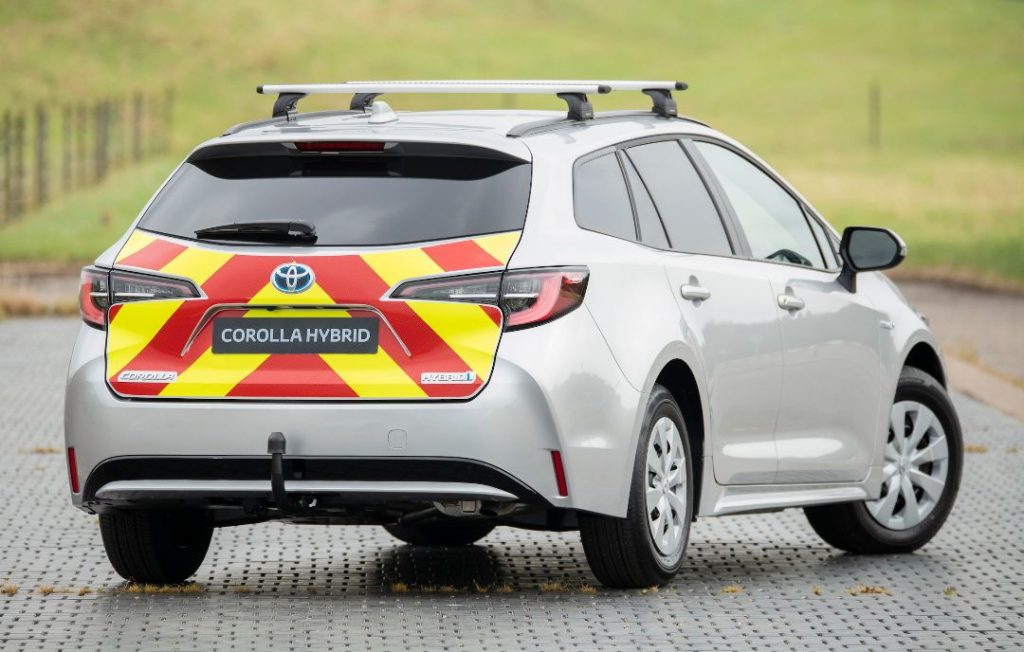
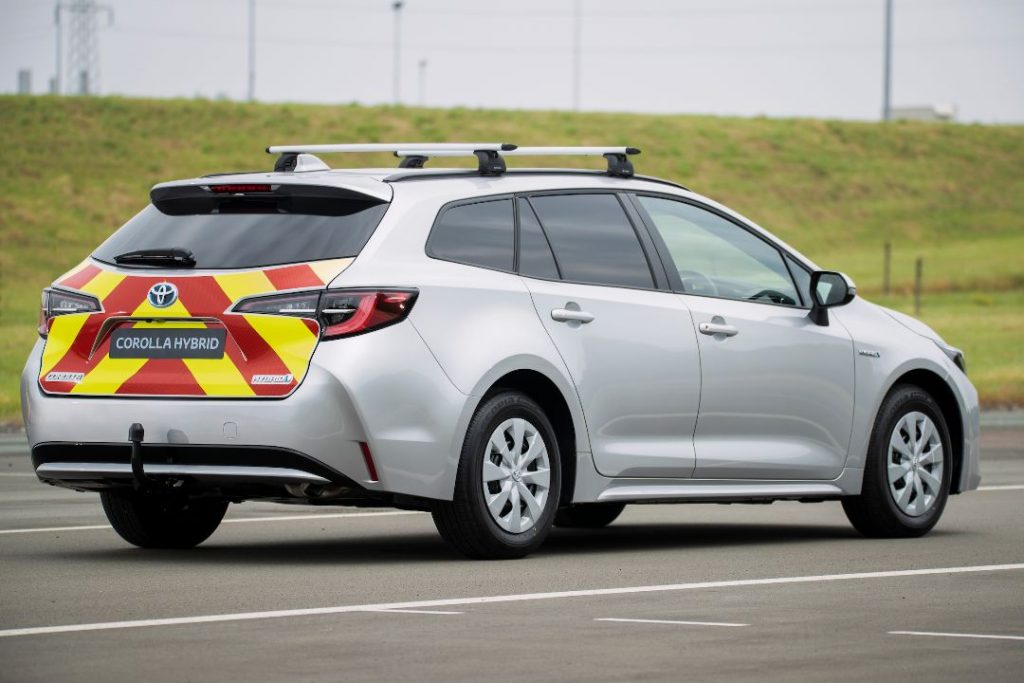
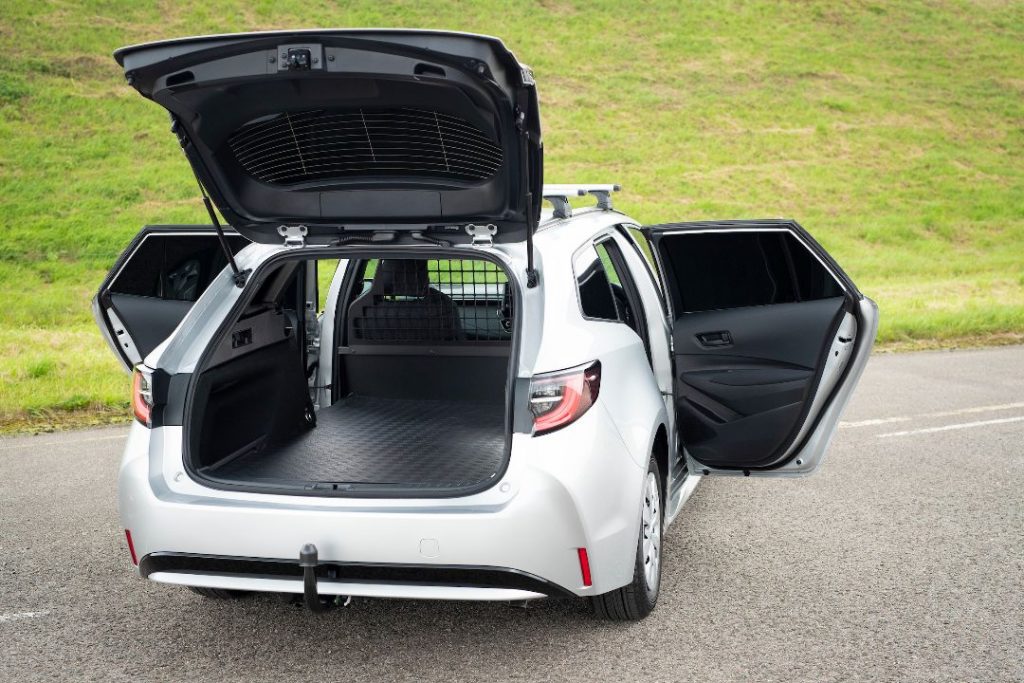
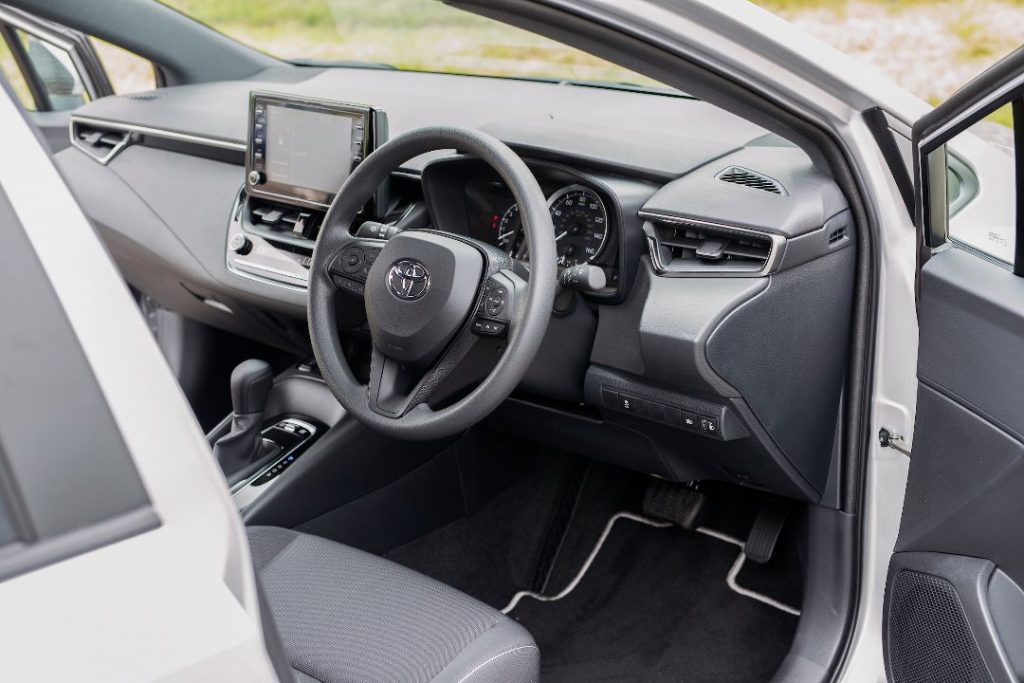
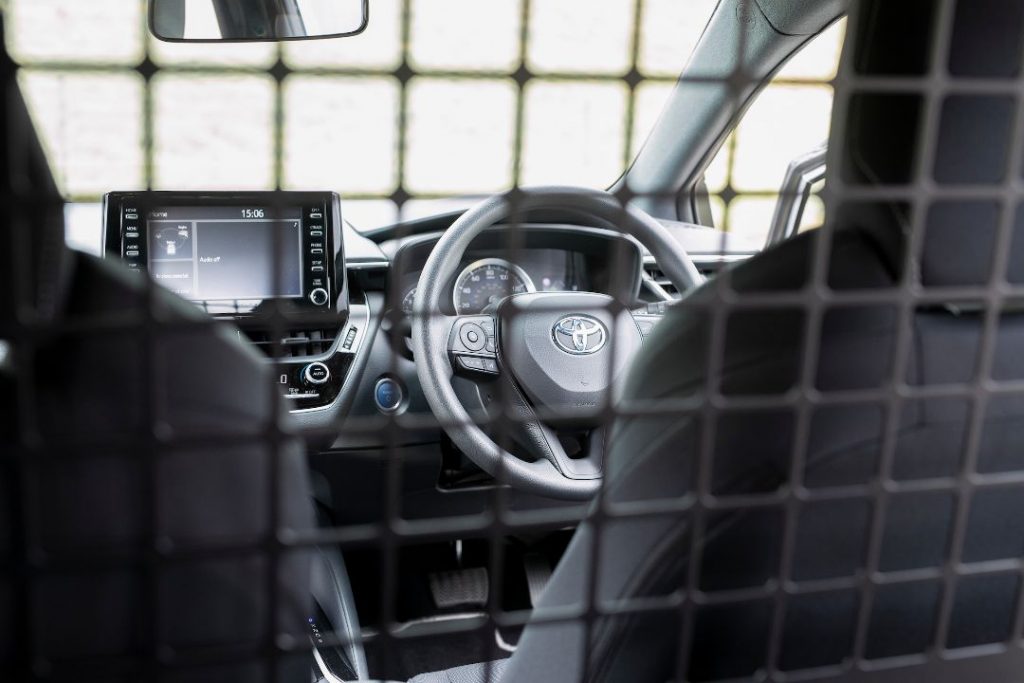
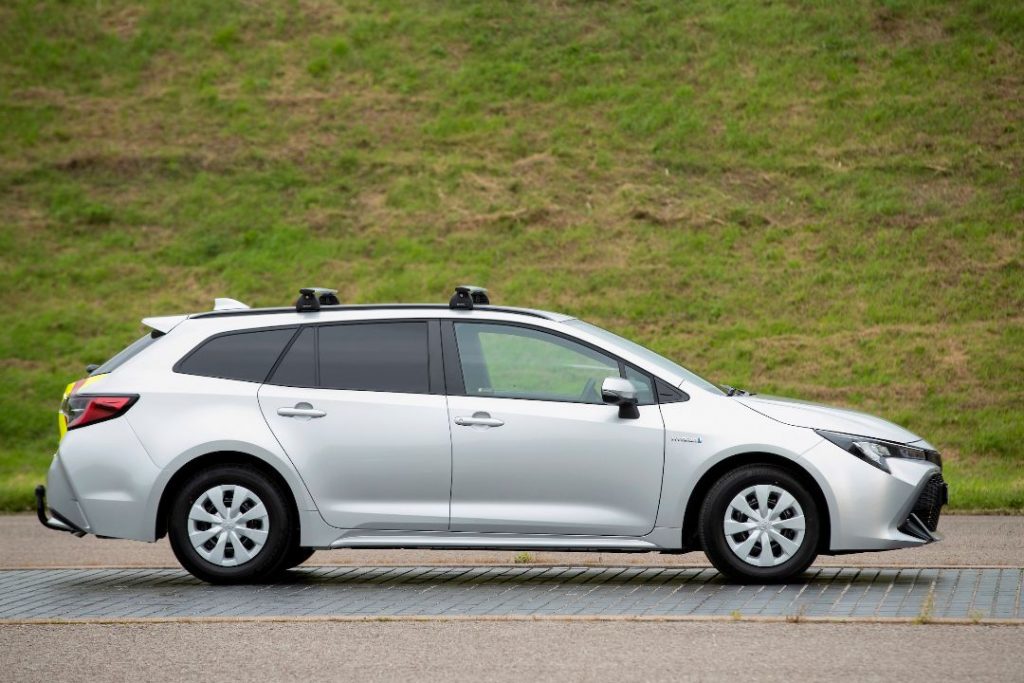
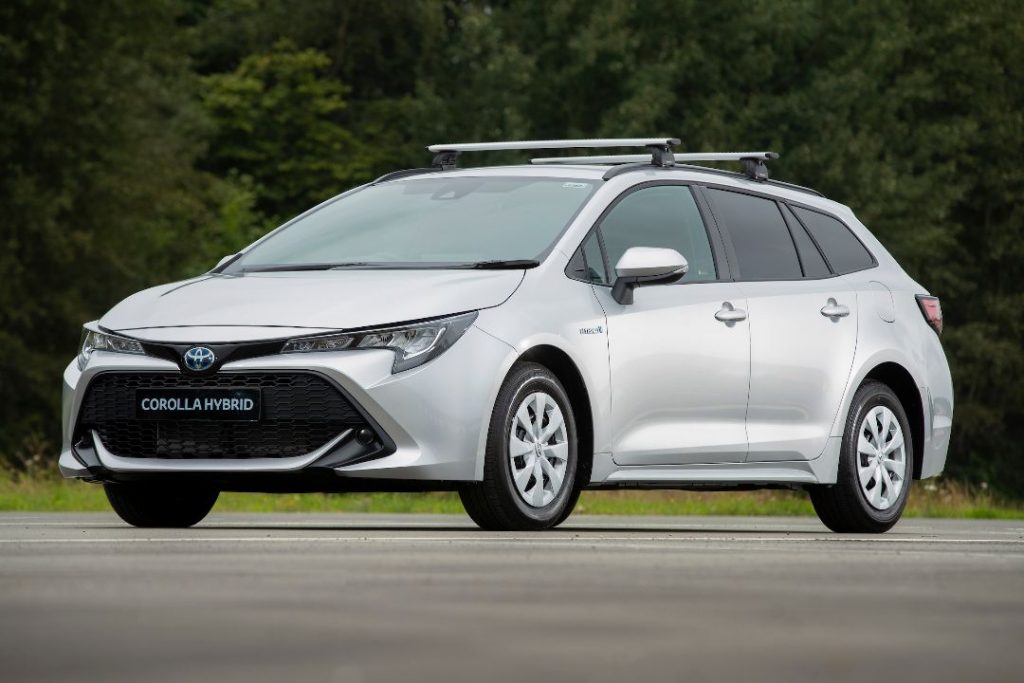
Word on the street in Burnaston is that there'll be a Toyota Corolla van built at the plant next year.
The Derbyshire plant already produces the Corolla family and a hybrid van would do nicely in helping Toyota reduce their overall CO2 outputs from all those Toyota Hilux pick-up trucks they sell.
Don't expect much more than the rear seats to be removed and some sticky black film on the rear windows but a Corolla van would be a welcome addition to a segement of the market that disappeared many years ago when the Vauxhall Astravan went off sale.
The Corolla commercial vehicle will join the rapidly expanding Toyota commercial vehicle range which includes the small Toyota Proace City and medium-sized Toyota Proace. There is also the Toyota Hilux pick-up truck and Toyota Land Cruiser Commercial.
Read the Toyota Proace review
Toyota will unveil the new van at the CV Show on Tuesday. Stay tuned for more from the show.